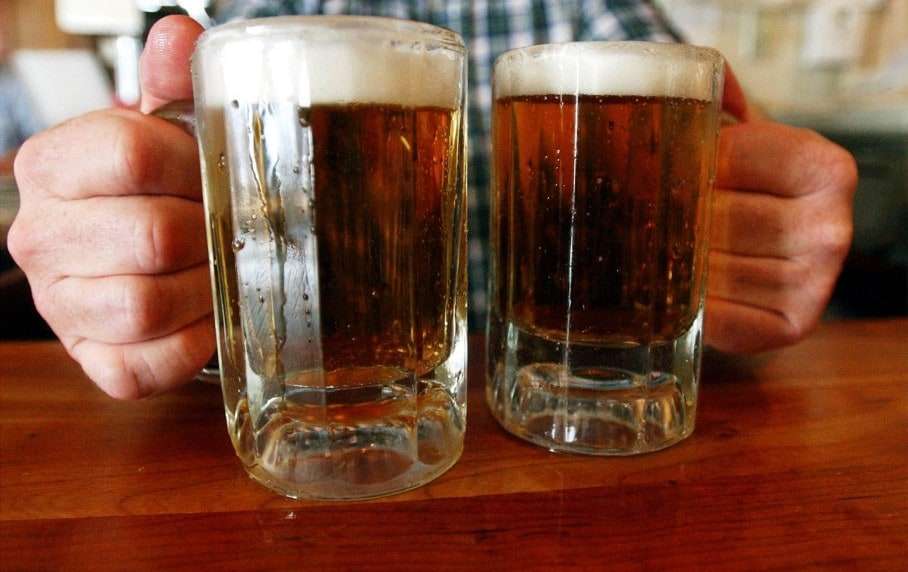The Volokh Conspiracy
Mostly law professors | Sometimes contrarian | Often libertarian | Always independent
Guns and alcohol

After various highly publicized shootings, those of us who are skeptical about gun controls are often asked: So what are we suggesting should be done about the shootings? If we're not suggesting gun controls (as opposed to proposals such as letting teachers or professors be armed, increasing concealed carry rights outside schools, providing school guards or trying to figure out, maintain and extend the remarkable fall in violent crime since the early 1990s) - the argument goes, we're not taking gun tragedies seriously.
Now I generally don't support the "don't just stand there, do something" school of criminal law. When all the proposals seem likely not to work, or do more harm than good, implementing one of them for the sake of "doing something" strikes me as a mistake.
But let me offer a concrete analogy (recognizing that, as with all analogies, it's analogous and not identical).
Every day, about 30 people are killed in the U.S. in gun homicides or gun accidents (not counting gun suicides or self-inflicted accidental shootings). And every day, likely about 30 people are killed in homicides where the killer was under the influence of alcohol, plus alcohol-related drunk driving accidents and alcohol-related accidents where the driver wasn't drunk but the alcohol was likely a factor (again not including those who died in accidents caused by their own alcohol consumption). If you added in gun suicides on one side and those people whose alcohol consumption killed themselves on the other, the deaths would tilt much more on the side of alcohol use, but I generally like to segregate deaths of the user from deaths of others.
So what are we going to do about it? When are we going to ban alcohol? When are we going to institute more common-sense alcohol-control measures?
Well, we tried, and the conventional wisdom is that the cure was worse than the disease - which is why we went back to a system where alcohol is pretty freely available, despite the harm it causes (of which the deaths are only part). We now prohibit various kinds of reckless behavior while using alcohol. But we try to minimize the burden on responsible alcohol users by generally allowing alcohol purchase and possession, subject to fairly light regulations.
Some of the regulations, such as bans on sales to minors, are quite likely wise (at least as applied to minors; I express no opinion on bans on sales to 18- to 21-year-olds), though imperfect. Others, such as bans on Sunday alcohol sales, are pretty clearly unwise. Others are closer calls. Others that one might imagine - e.g., a requirement that adults living with children lock up their alcohol so the children can't get to it - are, to my knowledge, never or almost never implemented, because they would unduly burden responsible adult drinkers.
But on balance the answer to "what are we going to do about alcohol-related deaths?" is "not much, other than trying to catch and punish alcohol abuse." And if someone says, "you're obviously not serious about preventing drunk driving and alcohol-related homicide, because you're not proposing any new alcohol bans or alcohol sales restrictions," our answer is generally (1) "just because there's a problem out there doesn't mean that we should impose new regulations that are likely ineffective and possibly counterproductive" and (2) "punish misuse of alcohol, rather than burdening law-abiding users."
Now the likely pathologies of gun prohibition - or even of many regulations that fall short of prohibition - would probably differ in some ways from the likely pathologies of alcohol prohibition. I've talked of some of those likely pathologies elsewhere, but this post is not about that. Likewise, the social benefits of responsible gun use are different from the social benefits of responsible alcohol use, and the fraction of drinkers who abuse alcohol is likely higher than the fraction of gun owners who abuse guns.
But those are questions for another post. My point here is simply that the right answer to "so what are we going to do about it?," even when the "it" is horrible, is sometimes "not that much," at least beyond forbidding intentional or reckless misbehavior.
We should certainly consider proposals that aim to ameliorate the problem, and weigh their costs and benefits. But we should not presume that there's somehow a moral imperative to Do Something. In fact, there's a moral imperative not to do something that's likely to make matters worse.


Show Comments (0)